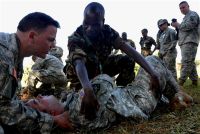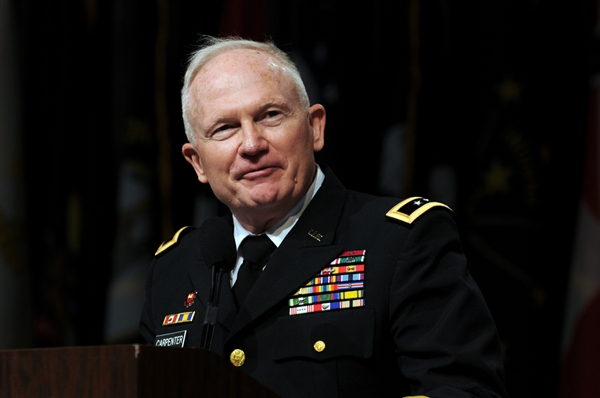LILONGWE, Malawi, May 16, 2011 — The after-action reports still are works in progress after a successful MEDREACH 11 medical humanitarian assistance exercise that wrapped up here May 13, but the Army Reserve already is exploring ways to expand its participation in theater security cooperation engagements in Africa and elsewhere.
Nearly half of the participants in U.S. Army Africa’s first MEDREACH exercise, which began May 3, were Army reservists, most of them assigned to the Boston-based 399th Combat Support Hospital. Working alongside the Illinois National Guard’s 404th Maneuver Enhancement Brigade, which provided command and control for the exercise, and small teams of Air Force Reserve dentists and active-duty Army ophthalmologists, they provided the bulk of the manpower to teach medical skills to Malawi Defense Force medics and provide medical and dental treatments at three outreach clinics during the exercise.
Additional Army Reserve soldiers contributed civil affairs and military information support operations expertise to the mission. These theater cooperation engagements support the broader U.S. strategy in the region, explained J.T. Ice, political-military advisor at the U.S. Embassy in Lilongwe.
MEDREACH 11 promoted two specific U.S. Mission Malawi goals for the Malawi Defense Force, he said. It increased its capacity to conduct peacekeeping operations on the African continent, and it helped Malawi become a stronger partner in responding to humanitarian assistance and disaster response crises. The exercise is an example of the “whole of government” approach to U.S. foreign policy objectives, with the military dovetailing with its State Department, U.S. Agency for International Development and Peace Corps counterparts to support common goals, Ice said.
“Working the interagency is the future. We have gotten our marching orders that the different parts of government will – not may – work together on these issues,” he said. “And here at the U.S. mission in Malawi, the country team understands that it takes different parts of government working together on these issues.”
Army Lt. Gen. Jack C. Stultz, chief of the Army Reserve, said he wants to see his troops play a bigger part in these engagements, particularly as wartime demands in Iraq and Afghanistan subside. The Army Reserve provides many of the enabling capabilities the active component has come to rely on, particularly in areas such as civil affairs, transportation and engineering. Stultz said he sees no end to demand for these capabilities, even after the current operations in Iraq and Afghanistan conclude. He cited “pent-up demand” among U.S. Africa Command and other geographic commands that he said would love to tap into Army Reserve capabilities to support more theater engagement activities such as MEDREACH 11.
The Army Reserve already supports many of these efforts: medical support and engineering missions in Central America and the Caribbean as well as Africa, and aboard U.S. Southern Command’s Continuing Promise and U.S. Pacific Command’s Pacific Partnership medical missions.
Stultz said combatant commanders get excited when he suggests contributing additional Army Reserve capabilities to enhance these activities. “What if in the future – when these units are in the [Army Force Generation] model and when there is no requirement for them in Iraq and Afghanistan – I could give you these units for 90 days at a time?” he asks, rather than the current two or three weeks.
“Their eyes light up,” he told American Forces Press Service. “They say, ‘Now you are talking about really expanding our horizons as far as engagement strategy, if we were able to build a strategy around that capability.’ ”
The approach could be used to fine-tune reserve-component capabilities, he said, while putting no additional burden on the active force. Army Lt. Col. Klemens “Van” Schmidt is on the leading edge of a division being established to help in making Stultz’s vision a reality. “I am the guy trying to figure out business practices for the Army Reserve, or to take all those pre-existing business practices we have and then try to put it into one well-working mechanism,” he said.
With two years of experience as U.S. Africa Command’s deputy for humanitarian assistance and program manager for military and civic assistance under his belt, Schmidt said the Army Reserve is particularly well-suited to support some of the operations for which he has helped to lay groundwork. Its structure is heavy with “enablers” – the combat support and combat service support capabilities as important to these engagements as to combat operations, he noted.
This blend of capabilities is ideal for many theater engagement missions such as MEDREACH 11, said Navy Cmdr. Jonathan Adams, exercise planner for Africom. Many of the participants are doctors, nurses and other medical professionals in their civilian careers, and also have operational experience from deployments to Iraq and Afghanistan. “So they bring an added level of professionalism and expertise in these specific areas we are dealing with,” he said. But beyond that, the reserve component has a manpower pool able to support the Africom exercise program.
“The biggest thing is that they are available,” Adams said. “The [active] Army is stretched very thin, but we want to have engagement. So they are a very useful, viable source of manpower to do these exercises.”
As they contribute needed capabilities in exercises such as MEDREACH 11, Schmidt said, they realize an often-overlooked payoff in terms of military occupational skills training. Working with their Malawi military counterparts, participants operated in austere environments not found in the United States, and exposure to diseases and challenges not seen at home, he explained.
Schmidt emphasized the importance of working with the host nation during missions such as MEDREACH 11 to ensure that what’s started can be sustained.
“Just going to one location at one time and giving 30 days of vitamins is just that – 30 days of vitamins. These episodic, one-time events are only one-time events,” he said. “You want to have something more sustainable.”
With an expanded role in security cooperation and international engagements, the Army Reserve can help to provide that sustainable support, Schmidt said. “We get wonderful experience” from even short, one-time engagements, he said. “But if we can get another group to come in a year later, six months later, that would be wonderful.”
Reoccurring engagements help build relationships and credibility about U.S. intentions in Africa, he said. Ultimately, Schmidt said, that’s the foundation for strong partnerships needed to address regional challenges, whether natural disasters or enemy threats.
Meanwhile, Stultz noted another consideration in tapping Army reservists to support these engagements: the troops themselves. He’s convinced that after playing key roles in an operational reserve, they’ll never be satisfied reverting to their long-abandoned “weekend warrior” status.
“We have created an environment and culture that [the soldiers] want to be part of and that they feel good about,” he said. “We have Army Reservists [for whom] two weeks at home station ain’t gonna cut it anymore,” agreed Schmidt. “They want to go out and do something exciting, particularly the ones who have been deployed. They have seen the goodness they can do, and they want to continue to do that.
“And we want them to continue to do that,” he continued, “because A, it retains them, and B, it is good for their [specialty] skills – the training they get in those austere places.”
Army Spc. Brian Zimmerman, a member of the Army Reserve’s 403rd Civil Affairs Battalion in Syracuse, N.Y., said he jumped at the opportunity to participate in MEDREACH 11 and would welcome more, longer engagements.
“It’s meaningful, and I can’t overstate the experience we’ve gotten from this,” he said, shaking hands with Malawian civilians as they filed from a tent, mosquito nets in hand, following a class in malaria prevention. “We are doing something. We are helping. I wish we could be here longer, because the work we are doing here really matters.”
Source:
U.S. Department of Defense
Office of the Assistant Secretary of Defense (Public Affairs)

 von
von 

